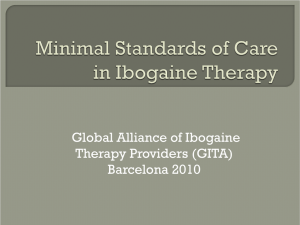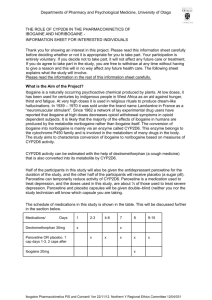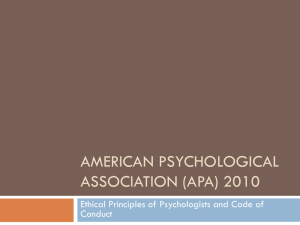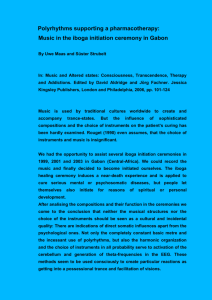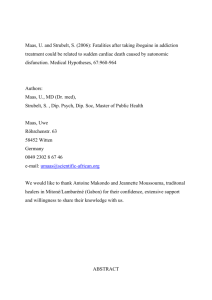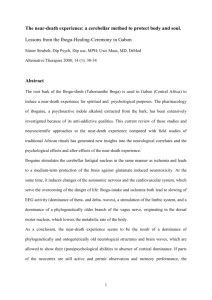Powerpoint File
advertisement
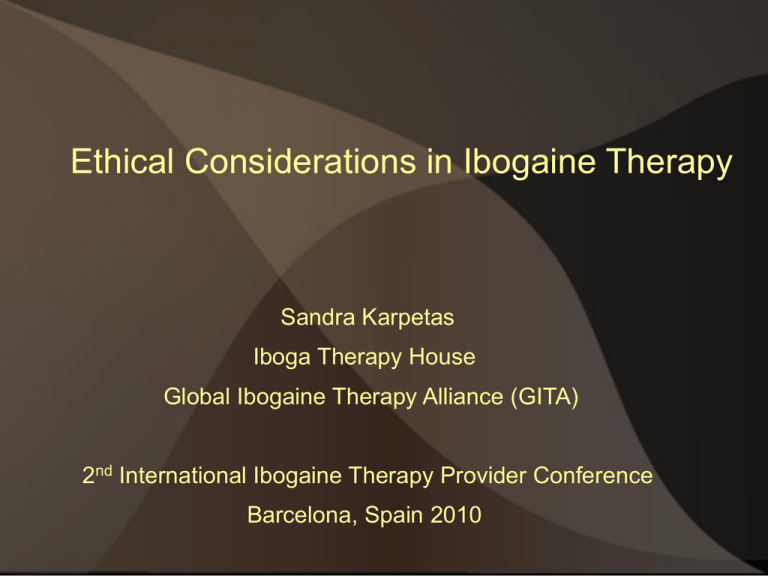
Ethical Considerations in Ibogaine Therapy Sandra Karpetas Iboga Therapy House Global Ibogaine Therapy Alliance (GITA) 2nd International Ibogaine Therapy Provider Conference Barcelona, Spain 2010 Why do we need ethical standards? Ethical insensitivity can contribute to: – Health and safety problems – Dissatisfied clients/patients – Public relations problems – Financial problems – Legal problems – Organizational challenges How can ethics in therapy be helpful? Ethical Standards: – Increase the quality of care and services provided – Increase transparency and accountability – Help to protect clients and therapists from undue harm – Foster greater recognition from the public domain – Create conditions for maximizing therapeutic potential Ethical Guidelines Internationally Recognized Ethics in Therapy and Research: – Beneficence: Promotion of well-being – Non-malfeasance: Avoid potential harms – Dignity: Respect for the person – Informed Consent: The person's right to information, to ask questions and to weigh the risks/benefits before making a decision – Transparency: Open communication about policies/procedures, disclosure of key information for client decision making – Confidentiality: Respect for privacy – Feedback: The right to provide feedback, whether positive Beneficence: Promotion of wellIbogaine therapists should promote health in all aspects of their being programming, procedures and policies. This includes key concepts such as health promotion, harm reduction and physical, psychological, emotional, spiritual and social wellbeing – Foster knowledge, skills, attitudinal changes and supports needed to help people engage in safer and healthier lifestyles – Avoid deficit thinking, build on strengths and support positive Non-malfeasance: avoid potential harms – There is an urgent ethical responsibility to decide whether the risk is too great for some participants, and thus to act to reduce or eliminate the risk even if that means stopping or modifying the therapy. – Therapists also have a responsibility to continuously educate themselves and remain up to date on ibogaine safety related information. Neglect of this responsibility can be considered negligence and/or misconduct and may contribute to adverse events and/or death. Dignity: Respect for the person – Respect autonomy and support informed decision-making – Accept and work with individual differences in client characteristics in both preventing and responding to potential challenges. These include unique risks associated with gender, age, sexual orientation, cultural/religious identity, etc... – Recognize that the realities of poverty, class, racism, social isolation, past trauma, discrimination, labels, stigma and other social inequalities affect both people's vulnerability to and capacity for effectively dealing with self care. Informed Consent The client has a right to information, to ask questions and to weigh the risks and benefits before making a decision to undergo therapy Minimal Risk If potential subjects can reasonably be expected to regard the probability and magnitude of possible harms implied by participation in the research to be no greater than those encountered by the subject in those aspects of his/her everyday life that relate to the research, then the research can be regarded as within the range of minimal risk. -Tri Council Policy Statement 1998 What does an ethical consent form consist of? form should include: A proper consent – Introduction/Background Information about ibogaine – Ibogaine's Legal Status in the country where therapy takes place – Therapeutic and Other Procedures from start to finish - in detail (include search, source of ibogaine, dosing, monitoring protocols, complementary/additional therapies, etc...) – Ibogaine's Potential Effects, Side Effects and Risks – Emergency Protocols (including specifics of what you would do in case of an adverse event, injury or death) What does an ethical consent form consist of? – Potential Benefits (including a disclosure regarding no guarantee that it will help) – Quitting or Withdrawing from Participation in the Therapy including your procedures and risks should someone decide to leave the site of therapy whilst under your care – Data Collection, Publication and Communication of Results - disclose any plans to share information with others/public – Confidentiality - handling and storage of personal info, files, medical info etc... plus staff/team confidentiality agreements What does an ethical consent form consist of? – Alternative Sources of Therapy – ibogaine therapy is not the only option and not necessarily the easiest/safest – Incentives– disclose any vested interests including financial – Client Rights and Responsibilities - include DWF Bill of Rights, outline client responsibilities, the right to file incident or grievance reports and how to do so – Who to contact for more information – include contact info – The actual Informed Consent statement page to be signed Elements of abeconsent form: Each page should numbered and have a space at the – bottom for initials acknowledging the following statement: I have read the contents of this page. I have had the opportunity to ask questions about it, and I understand what it says. – Initials____ The form should be written in an easy to understand manner (8th grade reading level). Complicated terms should be defined in an easy to understand way – The actual informed consent statement page – include a statement regarding minimal risk – Space for date, signature of client and witness signature/date Note: A copy should be available for client without extra Confidentiality – Respect for privacy before, during and after care – Handling and storage of sensitive information: - keep all files/personal/medical info secure and locked - consider using a secure server w/ SSL certificate - do not use publicly-accessible computers • – Ask client how they prefer to be contacted and when Omit personally identifying info in publications/reports/discussions – Each staff member should sign a confidentiality agreement Feedback Every client (regardless of whether they paid for the services or not) has the right to provide feedback, whether positive and/or negative and to file a grievance or incident report if they deem necessary. It is the responsibility of the therapy provider to provide information on how to do so. Ibogaine Incident or Grievance Report Form: http://www.doraweiner.org/incident.html A few other considerations: Compassion, empathy, strong interpersonal, listening, counseling and facilitation skills are of utmost importance. Individuals on the staff/team should possess the following: – Recognition of and respect for diversity Awareness of one’s own learning process – Ability to be attentive/good listening skills – – – – Trust in one’s way of working Ability to work with authority Willingness to do one’s own inner work Also: Have a fair and just conflict resolution policy in place Sandra Karpetas sandra_k@ibogatherapyhouse.net + 1 604 785 0924 www.ibogatherapyhouse.net Global Ibogaine Therapy Alliance www..ibogainefederation.org
